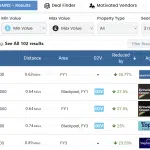|
Getting your Trinity Audio player ready...
|
Types of Property Investment
If you are interested in investing in property, you might be wondering what types of property investment opportunities are available for you. There are several options available depending on how much you decide to invest financially as well as how much time and involvement you would like to spend on your investment. We’ve compiled a list of the most popular ways to invest in property.
Joint venture
If you are new to property investment, then joint venture could be a great option for you. A joint venture is an investment that involves two or more parties agreeing to co-operate to achieve a certain objective. A joint venture is great if you are new to property investment and would like to partner with more experienced parties. For example, you could partner with another investor, reducing the amount you have to invest in the property as well as a contractor or developer to turn your vision into a reality.
If you decide to enter a joint venture agreement, it is important to set out a clear strategy with mutually agreed objectives. We would recommend seeking legal advice as there are several different ways you can set up a joint venture including: a contractual venture, limited liability partnership and company limited by shares.
Buy-to-let
Buy-to-let is perhaps the most well-known form of property investment. Buy-to-let investments involve the process of buying a residential property with the intent to rent or let the property to residential tenants. Buy-to-let properties are considered low-risk because the financial investment required is significantly lower than other investment options. Buy-to-let properties in sought after areas can generate a significant rental income and using Property Deals Insight’s rental yield tool, you can find the areas that are best for buy-to-let investment.
There are several things you should consider before venturing into the world of buy-to-let investment. It is important to consider mortgages as buy-to-let mortgages usually have higher deposits and interest rates than residential mortgages. As well as the financial side of your investment, it is important to consider the condition and location of the property as well as the responsibilities involved with becoming a landlord.
Flips
You may have also heard property flipping referred to as ‘fix and flip’, and this strategy is a simple way to make a profit. A property flip involves finding a property that needs to be renovated for a low price, renovating it and selling the property to buyers for a much higher price. For example, if you purchase a property for £200,000 and spend £50,000 on renovations and other costs and sell the property for £300,000, you’ll make £50,000 profit – simple!
Unfortunately, flipping isn’t quite as simple as it sounds as there are a lot of things that could potentially go wrong. We would recommend speaking or partnering with someone who has experience of flipping properties as well as keeping an ‘emergencies fund’ for any unexpected costs that may arise.
Commercial property
Commercial property investment opportunities can be split into 4 main categories: retail, leisure and restaurants, offices and industrial. Before deciding which of these 4 types of commercial property you would like to invest in, it is important to do you research and identify what type of property there is demand for.
Commercial property investment is a specialised area and usually more complex than a traditional buy-to-let; however there are a few different ways you can invest in commercial property:
- Direct investment – buying a share or an entire commercial property.
- Direct commercial property fund – an investment scheme with other people that invests in a portfolio of commercial properties.
- Property stocks and shares – you can buy and sell shares on the stock market in listed property companies.
- Indirect property fund – a collective investment scheme that buys shares in stock-market listed property companies.
As there are so many different options and considerations when investing in commercial property it is important to do your research and if you can, contact someone with experience and ask for their advice.
HMO
HMOs or Houses of Multiple Occupancy are popular amongst landlords that wish to get the best possible rental yield from their property. HMOs are often close to universities or hospitals and are often larger than most properties. Once converted to a suitable HMO layout, for example 4 en-suite bathrooms and a shared kitchen, licensed HMOs can double your rental income.
The rules and regulations for HMO licenses can vary depending on the local authority, so ensure you research thoroughly the areas you are considering for HMO investment.
Holiday lets
A holiday let is likely to be an option you may not have considered. In a time when international travel is extremely difficult and unpredictable, more people are opting for ‘staycations’ providing a great investment opportunity. Holiday lets are particularly popular with families and larger groups, as they are often more cost-effective than multiple hotel rooms. Whilst a holiday let is a little more work, as the property will need to be maintained and cleaned between each set of holiday makers as well as marketed, they can prove to be very lucrative. Holiday lets can provide great income, especially if you choose to invest in a city apartment or coastal property, and in some cases you can earn the same amount in a week as you would in a month with a standard buy-to-let property.
If you are interested in investing in property, Property Deals Insight has lots of great tools and resources available to help with your research.
Sign up for your free on our website www.propertydealsinsight.com/signup













